The FUSILLI team from Kharkiv has created a sustainable platform for the development of its Living Lab activities. It is being established on the basis of the private Kharkiv school OCHAG. The Kharkiv Children Food Living Lab (KCFLL) unites the perspectives of different community representatives (students, teachers, parents, academia, representatives of the City Council) and has thus become the platform for cooperation and co-production of knowledge about food systems and solutions via common local experiences. For instance, the Living Lab meetings include discussing urgent food issues and developing community-based solutions to improve the functioning of the local food-system.
Unhealthy food habits of children and youth have been identified as one of the key food challenges on the local level. As a consequence, the students of the OCHAG school were selected as the main target group of the Kharkiv Children Food Living Lab activities, with a particular focus on students in 7th grade (12-13 year old children) due to the active formation of their food habits at that age. Besides, this target group is especially susceptible to the influence of fast food advertising and therefore especially needs to be introduced to healthy food models. 12-13 year old students are psychologically open to collective practices and joint creativity. That is why this target group was invited to launch the Kharkiv Children Food Living Lab realization.
The core idea of the Kharkiv Children Food Living Lab is to co-create and share knowledge and innovative values about kids meals. KCFLL examines theoretically and practically different aspect of kids food, addressing issues of:
- food production and storage;
- healthy food for children at school and at home;
- food safety and biosecurity issues;
- private and public festive food;
- urban food network for children and families;
- political and regulatory frameworks for food production and distribution.
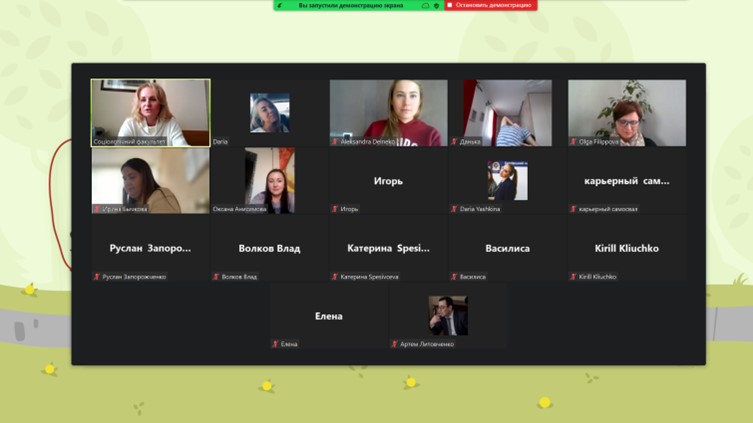
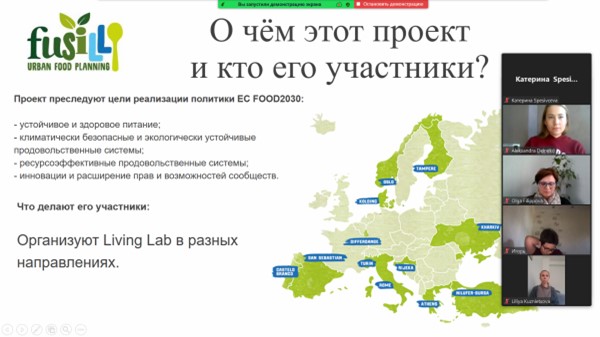
“For the development of the Kharkiv Children Food Living Lab strategy we use open-innovative methodology, involving different private-public partners. That helps to integrate research and innovative approaches, making the Living Lab very close to the real life. Our plan includes the invitation of famous local food initiatives representatives who provide their own story telling experience touching meaningful topics such as food production, recycling, the influence of food on health etc.”
says Olena Muradyan (leader of the local Kharkiv FUSILLI team) about the project realization process.
Within the project realization, Kharkiv Children Food Living Lab meetings are organized each two weeks. Meetings are performed as interactive lectures, topical discussions, expert interviews, open space initiatives, business-games and so on. The students are actively involved in the KCFLL planning by providing ideas of food issues that are most interesting for them. The lecture topics always correspond to the children’s interests (in this case we rely on the results of the survey conducted during the kick off meeting with the students). On the other hand, the topics of the Living Lab meetings are relevant to the Ukrainian society and the community of Kharkiv as well. Here is what was discussed in the meetings:
One of the first meetings was dedicated to the anthropology of food, discovering different aspects of the food importance for daily life (not only for physical survival). During the lecture presented by Associate Professor of School of Sociology V.N. Karazin Kharkiv National University Olga Filippova, the children shared their eating habits and food traditions in their families. Most of the children’s stories were about the traditions of their grandparents (especially holiday traditions: New Year, Christmas, Easter, etc.). Most of the “parent” traditions concerned watching movies during the dinner-time. However, the children were very eager to create their own family food traditions.
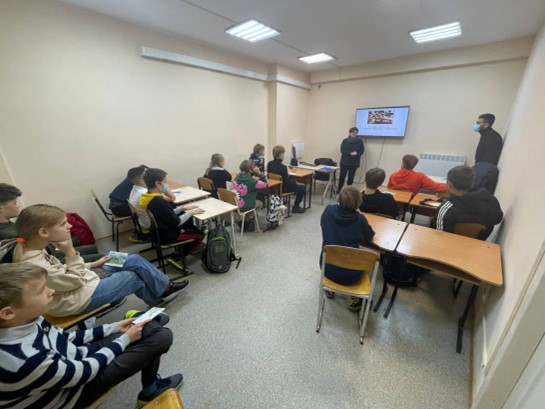
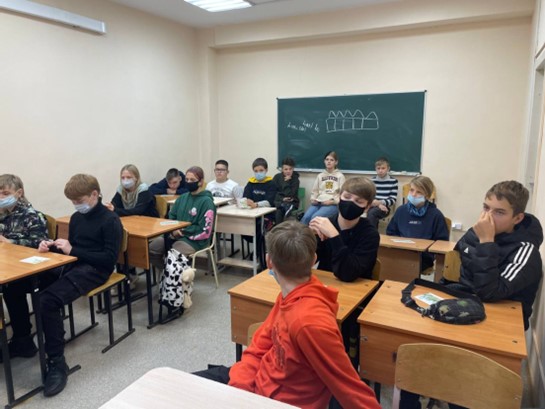
Another lecture was dedicated to healthy food and a healthy lifestyle. It was conducted by Associate Professor of School of Sociology V.N. Karazin Kharkiv National University Oleksandra Deineko and a student’s father who is a professional ophthalmologist. The participants expressed their views on whether they need to eat healthy food. The vast majority of children said that they have already begun to think about the necessity to eat not only tasty, but also healthy food. The ophthalmologist explained how his profession is related to nutrition and how nutrition affects our health. He ended his story with a well-known recommendation “One apple a day keeps a doctor away”, which was so appealing for the children that they received this delicious and healthy fruit at the next meeting.
Another encouraging lecture was devoted to the issue of food inequalities. It was conducted by the Associate Professor of School of Sociology V.N. Karazin Kharkiv National University Artem Litovchenko, who told the students about social, economic and cultural inequalities that affect food production and consumption. Special attention was given to the discussion between the lecturer and the students during which the children tried to find answers to the questions: “Why are there inequalities in food consumption?”, “How can such inequalities be overcome?”, “What are the economic and social characteristics of food inequalities?”.
Before the New Year holidays, the PhD students Ruslan Zaporozhchenko and Daria Yashkina of the School of Sociology V.N. Karazin Kharkiv National University organized a session on the business game “Healthy Food Restaurant”. The task of this game was to come up with and try to develop a model of a children-owned restaurant with a specific healthy menu. The participants’ choice of cuisine was not limited, so they could choose any of the world cuisines or offer their own). The game also required to determine the restaurant‘s target audience, to develop a pricing policy for each dish or drink and to articulate their own vision for food production and food waste disposal. It helped to combine theoretical knowledge gained during lectures with practical ways of visualizing their own projects. The teams presented their projects and answered questions from the other students. Each team received certificates for participation and goodies.
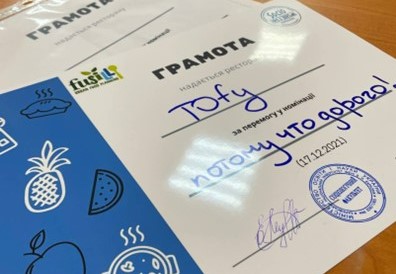
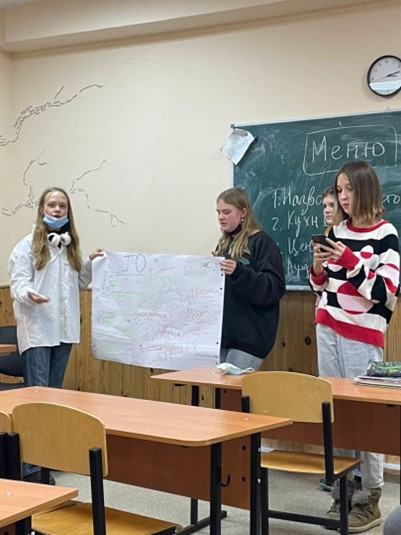
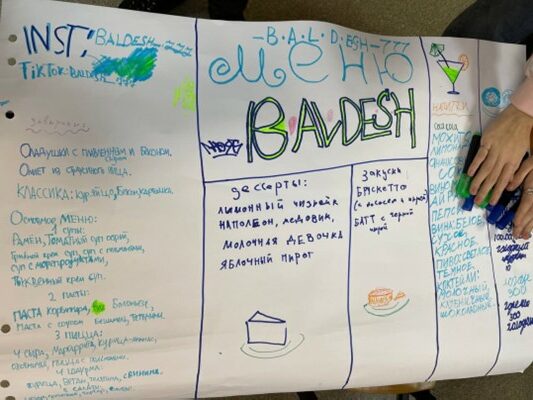
Right now, the Kharkiv Children Food Living Lab is expanding its target audience by involving two more Kharkiv city secondary schools in the joint Lab activities. During this term, the participants of the Kharkiv Children Food Living Lab will meet with local food initiatives representatives and will be invited to participate in Food City Plan development.
Credits for all images: Daria Yashkina (School of Sociology, V.N.Karazin Kharkiv National University)